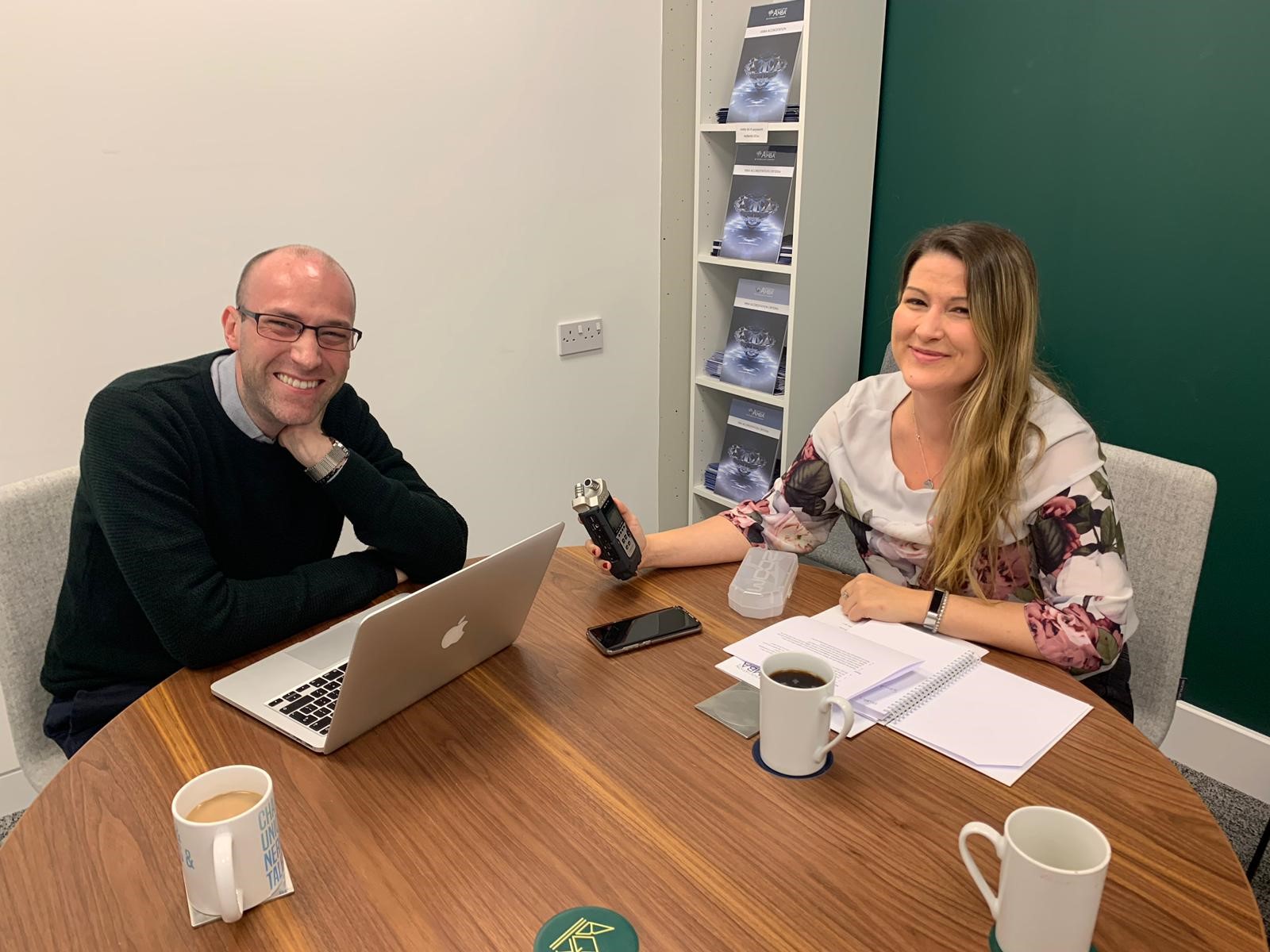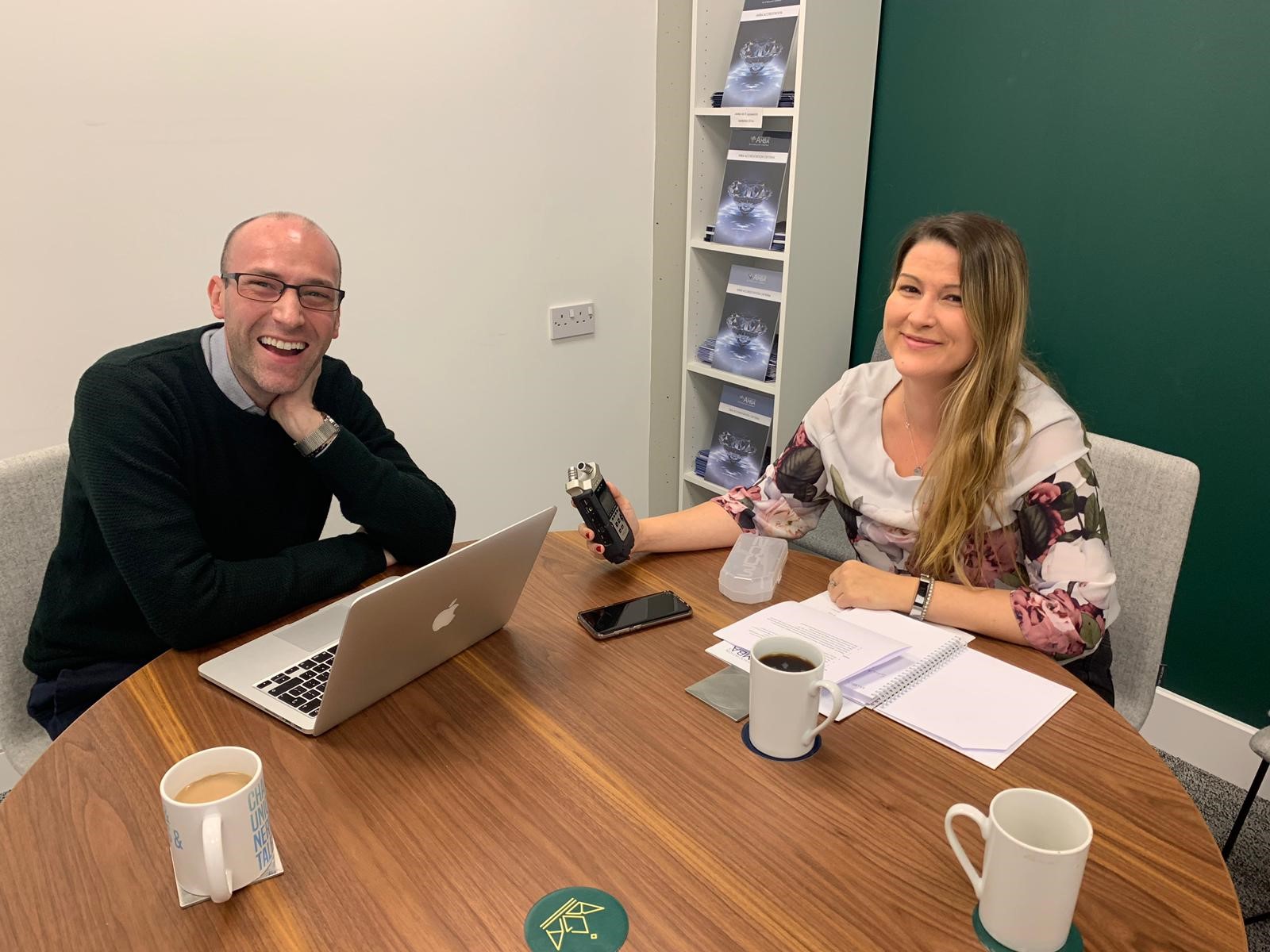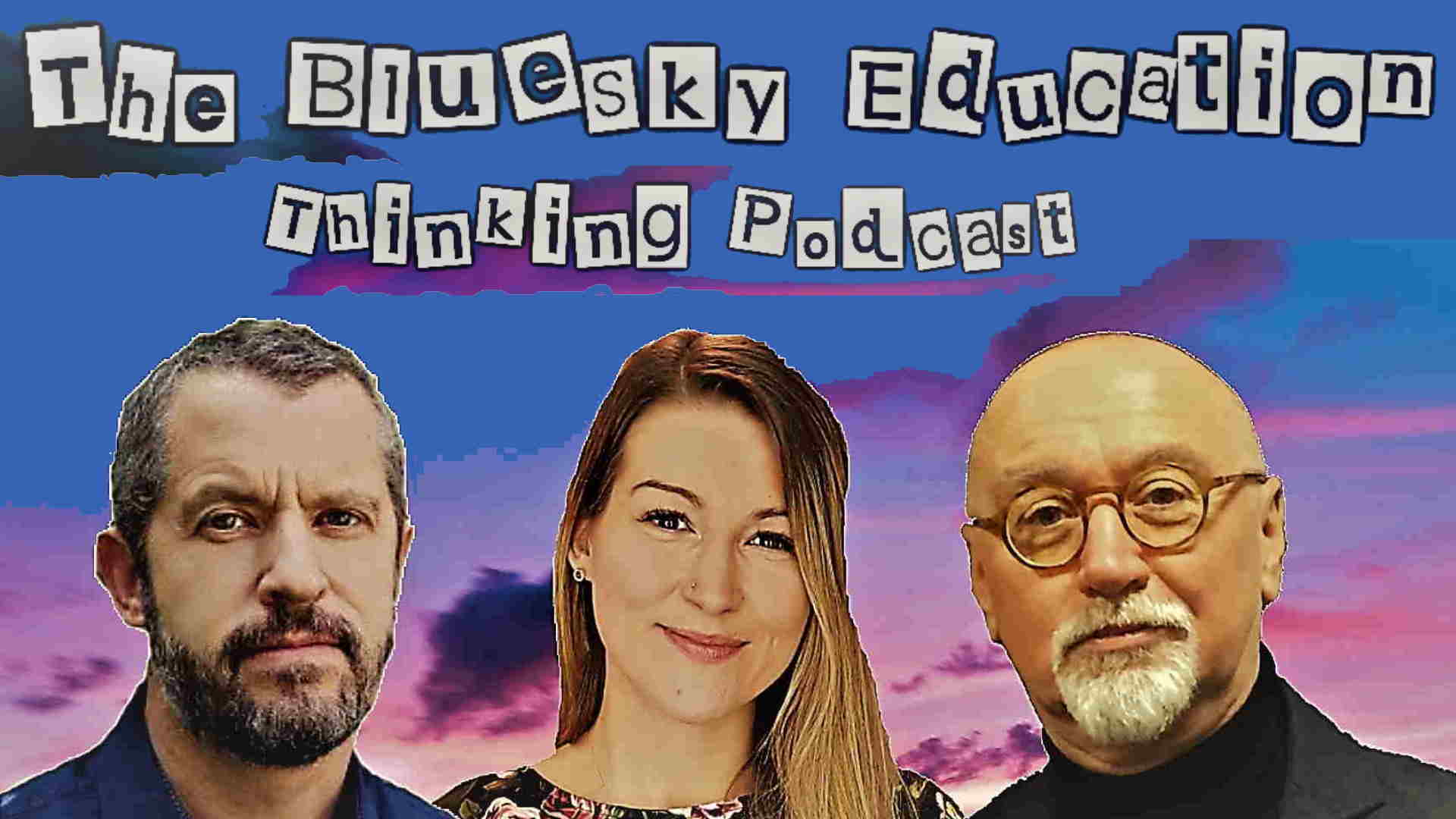In episode two of the BlueSky Education Thinking podcast International BizEd Guru Matt Symonds, BlueSky Education’s Adrian Barrett, Stephanie Mullins and Peter Remon, and David Woods-Hale of the Association of MBAs (AMBA) and Business Graduates Association (BGA) discussed the role of sustainability in business education.
Here's what they had to say:
Adrian: Welcome to the BlueSky Education Thinking podcast. Hello, everybody, it's Adrian Barrett. With me today I have Stephanie Mullins, Head of Practice here at BlueSky Education, and the man with his finger on the pulse of the beating heart of business education, Matthew Symonds. Today we're going to be talking about sustainability and its role within business education communications. So, without further delay and without further excessive toadying, Matt, across to you.
 Matt: Thanks, Adrian. Of course, beyond finance, marketing, strategy and, in recent years, entrepreneurship, I think sustainability really has become a key theme for business schools, not just in terms of their curriculum – we do already see that in a number of programmes – but also, of course, in the career aspirations of the students coming out of the bachelor's and master's programmes. Steph, is sustainability a theme that you see a lot more often with BlueSky clients?
Matt: Thanks, Adrian. Of course, beyond finance, marketing, strategy and, in recent years, entrepreneurship, I think sustainability really has become a key theme for business schools, not just in terms of their curriculum – we do already see that in a number of programmes – but also, of course, in the career aspirations of the students coming out of the bachelor's and master's programmes. Steph, is sustainability a theme that you see a lot more often with BlueSky clients?
Steph: Absolutely. And I actually think it's being driven by the press as well. The media are really keen for stories in this area. So we arrange things like expert commentary for academics, who provide advice, as well as other stories like alumni who become entrepreneurs in this area.
Matt: Well, as with others of these BlueSky Education Thinking podcasts, I believe that you've been out and about talking to a number of experts about sustainability. Let's hear what they have to say.

David: My name is David Woods-Hale. I am Director of Marketing and Communications at the Association of MBAs and Business Graduates Association. My role basically encompasses all our communications, so marketing, social media, PR, email campaigns, research and insight and oversight of our publications, AMBITION and Business Impact.
Steph: Fabulous. So, in this episode of our podcast, we've been talking about sustainability and its growing importance on the industry. How have you seen its impact?
David: It depends on how you want to look at sustainability. If you look at it from a climate change perspective, I think that's probably the area that's most prominent in the mindsets of certainly our network at the moment. And I think that's because of, you know, if you said that the climate change debate was a hot topic that would be an understatement. And I think given movements like Extinction Rebellion, or Greta Thunberg, these people are bringing it to very much into the public arena.
We're going to be coming out with a huge piece of research, in the next year, into climate change and how business goals and MBAs are addressing and responding to the increased calls for action in this area. But this year, we put a preliminary question in one of our pieces of research where we asked business school leaders what they thought that business priorities were for the year ahead, and also what their priorities were for the year ahead. We polled about 151 deans from across our network of business schools. Two thirds, 67%, said that embracing more environmentally friendly technology would be a big priority for businesses over the coming five years. And more than three quarters, 76% of business school decision makers, said that the biggest impact that they could have in business would be encouraging other businesses to be more sustainable and to really adopt this agenda. There's been research that came out from the International Energy Agency, and they're saying that without a grand coalition of governments working together, there's no way that there would be enough renewable energy to really turn the tide on the way things are going with climate change, to improve that for the better, to make enough of a difference to really make an impact.
So, I think that the challenge for AMBA and for our schools is to really think about how we can work with the business school community and the business community to get them on board with this agenda. And it's really encouraging that our research, or at least our preliminary findings, are showing that that's something that they're going to be prepared to do and something they're very aware of. I think that business schools are in a really privileged position because they have the opportunity to carry out research into these areas. And they also have an impact on thought and actions. So, they come into contact with business leaders, or would-be business leaders, all the time, as well as employers. And I don't think we can underestimate the power of this community in discussing these issues, and really trying to get people on board with that agenda.
 Steph: Definitely, I totally agree. And I don't think we can really emphasise enough how important this topic has become in the world, not only in business education, but I know that you've recently launched the Business Graduates Association. And that's been a big moment for you in the last year. And now I understand it has a focus on sustainability. Could you tell us a little bit more about that?
Steph: Definitely, I totally agree. And I don't think we can really emphasise enough how important this topic has become in the world, not only in business education, but I know that you've recently launched the Business Graduates Association. And that's been a big moment for you in the last year. And now I understand it has a focus on sustainability. Could you tell us a little bit more about that?
David: Yeah, absolutely. So, the Business Graduates Association has been the biggest launch that we've conducted our 50 year history. The reason why we launched BGA was because we want to cap the number of schools that AMBA will accredit around the 300 mark; we want to be the accreditation body that that does look for excellence and accredits only the top 2% of business schools in the world. But, at the end of the day, we are a charity. And I think it's important that we stick to our charitable commitments of really improving business education across the world. And BGA exists to work with a much wider pool of schools that are making an impact. So I think that that's the differentiator, it's about the difference that these schools are making in the world. And obviously, sustainability is a huge part of this. So the way that BGA works with schools is we obviously look at their curriculum, we look at their faculty, we look at their research, we look at how the schools are run and how their programmes are run in the same way that AMBA does to that extent, but what's perhaps a little bit different is we look at the difference they make in their local communities and in the wider business world and also wider society. So if we're really ensuring I suppose, through our accreditation process with BGA, that the schools are adopting the UN sustainable development goals. And we want to make sure that ethical practices are coming across, and how we'll position ourselves in our research, I suppose from my perspective, we'll be looking at, like climate change or poverty areas where business schools can make a difference. And I think that's the sort of modus operandi and the USP of BGA.
Steph: Definitely, I think not one of the 17 UN sustainability goals can be achieved without the help of education.
Looking at the future, where do you see things going? Do you think that sustainability will become even more important?
David: Yeah, of course, I think that it's moving into the public arena. And I think what's really interesting about areas in sustainability and using climate change again, as another example, you know, as little as 10 years ago, people were debating whether or not climate change was even a thing, whether or not it was actually happening. And I know that there are certain world leaders that still debate whether or not it's a thing, and I'm not going to say too much more about that. But as I say, these movements like Extinction Rebellion, whether or not you agree with their ways of doing things, they are bringing these issues into the public arena. I think that, as I said before, this movement of business schools is a powerful global movement that has the potential to make real change in the world and is making real change in the world. And earlier this year, at our global conference in Istanbul, we had several speakers that talked about sustainability from the perspective of the environment, from the perspective of helping people in poverty or looking at perhaps disenfranchised communities. And they brought some really scary issues to the fore, you know, that the world is a scary place at the moment and there are so many risks, and so many dangers, but I came away from that conference feeling really encouraged that people have the opportunity to make a difference here and they want to make a difference. And I think that once that incentive is there, and that need to make change is there with these powerful thought leaders, then that has to be a good thing. And it is a good thing. So I feel quite optimistic. I think that it's perhaps upsetting that we've needed to get to the stage that we are, and a lot of damage to the world and to our communities and to the way we think has been done. But I think it's really positive that we've got something to move forward from and make a change.

Steph: Definitely. I think the industry as a whole can have a really serious impact. One of our BlueSky account managers actually has been working with business schools all over the world. Peter, tell us why it's so important to business schools we've been working with.
 Peter: Yeah, that's right. Yes, sustainability is really relevant and popular in the media at the moment. Whether we see it through the channels of debate, like talking about climate change with politicians, or coverage of stuff like Greta Thunberg and Extinction Rebellion and the protests going on, and then as you talk about the business education side of things with, just this year, AMBA releasing their first responsible business report, it’s really a key issue. That's, I think, going to continue throughout the next few years. And it's a great opportunity for schools already doing stuff in this area, with initiatives that are already around sustainability and the environment, to jump on board this sort of relevance and popularity and really make it their own in that sort of space.
Peter: Yeah, that's right. Yes, sustainability is really relevant and popular in the media at the moment. Whether we see it through the channels of debate, like talking about climate change with politicians, or coverage of stuff like Greta Thunberg and Extinction Rebellion and the protests going on, and then as you talk about the business education side of things with, just this year, AMBA releasing their first responsible business report, it’s really a key issue. That's, I think, going to continue throughout the next few years. And it's a great opportunity for schools already doing stuff in this area, with initiatives that are already around sustainability and the environment, to jump on board this sort of relevance and popularity and really make it their own in that sort of space.
So examples from schools that we've worked with, for instance Durham University Business School, Imperial as well… Whether it's Jeff Moore at Durham, who's the Associate Dean for ethics, responsibility and sustainability, we've done a huge amount of work with him. We have national outlets such as The Daily Telegraph, where we've worked on pieces to do with climate change, and how businesses can reduce their footprint. And then more sector specific stuff. So a webinar he did with Ambition magazine, looking into how business schools can teach us sustainability. And then I gave the example of Imperial, they have a climate investment finance research centre. So there's been some stuff as well around there with trade press in that sort of area. And also national outlets talking around how businesses can invest in this area and make it a benefit to them, but also to society as well.
Steph: Awesome. It sounds like you've done some great work. And I know you work with business schools and universities all over the world. You know, there's some great examples there. And it's not just comment that professors want to have in the press about how businesses and the rest of the world can be more sustainable, but also how the schools themselves are more sustainable.
Peter: Yeah, exactly. So, as you say, not only is it showing academic expertise and teaching how businesses can be sustainable in this area. If you're talking about in the press, you also have to practice what you preach, really. So showing how not only you teach this sort of area, but also what you're doing yourself as a business school, what you're doing in that area is also something that's going to be interesting to media. So, for example, Durham, with their new business school, and how it's made to be sustainable for the environment, and plenty of other schools doing similar stuff in this area as well.
Steph: Awesome. Well, thank you so much for joining us today. Thank you.
 Adrian: So Steph, I understand that you've been BlueSky’s very own Judge Dredd recently, albeit without the uniform, the motorbike, and the fearsome array of weaponry, which is all a bit misleading… so let's get to the point. You judged one of the AMBA awards, which one was it?
Adrian: So Steph, I understand that you've been BlueSky’s very own Judge Dredd recently, albeit without the uniform, the motorbike, and the fearsome array of weaponry, which is all a bit misleading… so let's get to the point. You judged one of the AMBA awards, which one was it?
Steph: It was the business school impact on community and society award.
Adrian: Yeah. Okay. And can you tell me a bit more about that?
Steph: Absolutely. So it's part of AMBA’s awards, and they do this every year and they recognise business schools for different things. And this award in particular focused on business schools’ goals for helping communities and societies in their local areas.
Adrian: Right. Okay. And so it's a giving something back to the local community sort of idea?
Steph: Absolutely. And a couple of schools actually had really good sustainability initiatives that I'd love to tell you more about. So one of the schools was Paris School of Business, and they're one of the leading French Grande École business schools. PSP was actually shortlisted in this category for it's acting beyond knowledge CSR initiative. So, this developed partnerships with organisations that follow environmental goals, which is great for sustainability. And it also encouraged students to use these CSR initiatives to make a difference.
Adrian: Right, and who else was involved?
Steph: So I was on a judging panel with four people, all experts from the business school realm. It was actually a great honour to be asked, and this is the fourth year that BlueSky have been involved.
Adrian: So yeah, you’re a seasoned judge now.
Steph: I am a seasoned judge now! Yeah, but the other entry that I actually really liked was Porto Business School, and they’re the business school of the University of Porto.
Adrian: In Portugal itself obviously.
Steph: Exactly. And they actually have a centre for business innovation, and they conduct a large number of social responsibility and sustainability initiatives. And they were nominated for this award, in particular, for reducing the school's environmental footprint. It received awards and certificates for its contribution to environmental sustainability.
Adrian: Which obviously is the big thing at the moment, isn't it?
Steph: Definitely, definitely. And I think a lot of business schools can learn from this in terms of sustainability, and their contributions include things like making an artificial lake, installing maximum efficiency air conditioning systems and intelligent lighting systems, decreasing consumption of electricity, and starting paper free school and plastic free school products.
Adrian: Right? So it's all practical stuff rather than just sort of aspiration and theory.
Steph: Exactly. It's actually implementing things when sometimes people just talk the talk.
Adrian: Yeah, yeah. I just think it's so important that business schools actually show that they're really doing something rather than just talking about it.
Steph: Yeah. And thankfully AMBA awards offer an opportunity for them to showcase this and, actually say, this is what we're doing. And this is how we're being so sustainable.
Adrian: Yeah. Okay, great. So, you know, we've had lots of really good stuff in this particular podcast, even though say it myself, but can we just sum up what we think the key takeaways are on this subject?
Steph: Definitely. So, we've heard from David at AMBA about research they're doing on business schools, how they're dealing with climate change, and sustainability in the year ahead. It's going to be amazing, massive impact and we're definitely seeing it becoming more and more important. Peter gave us a wonderful insight into some of the coverage we've helped Durham University Business School achieve in the area of sustainability. From their specific expertise and professors and what they're actually doing themselves as a business school. And then we chatted about the awards that I judged and some more fantastic initiatives from business schools who are really getting into being more sustainable.
Adrian: Yeah, in a very practical way, as we were saying. So, Matt, what do you think? How does what we've heard today fit in with your wider experience?
Matt: Yeah, with sitting down with deans as they talk about the role that business schools will play in FinTech, big data and analytics healthcare, I think sustainability and CSR just crosses every sector. And part of it is the push for business schools and how they bring that both into the curriculum even, you know, we see schools like Rotterdam that include issues of sustainability in their staff reviews. But the other push, of course, is students themselves and their sense of purpose and where sustainability fits in. So I think you know, we've seen certain fads and trends that have entered into business school curriculums in the last 10-20 years, but sustainability, as it would suggest, it's here to stay.
Steph: I agree, I think we're just going to see its impact more and more in rankings, in schools, and students – and they're going to want to see how schools are actually really making a difference.
Adrian: Yeah, I mean, it's really nice to see the fact that, while certain world leaders that won't be named here today might be dodging the bullet, business schools are really stuck into this area and actually doing something concrete rather than just talking about it.
Listen to this and other episodes from the BlueSky Education Thinking podcast below.
Interested in being a guest on a future episode? Get in touch.



